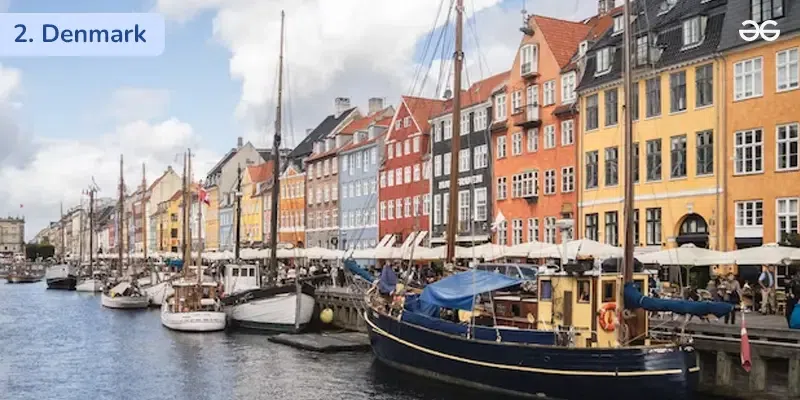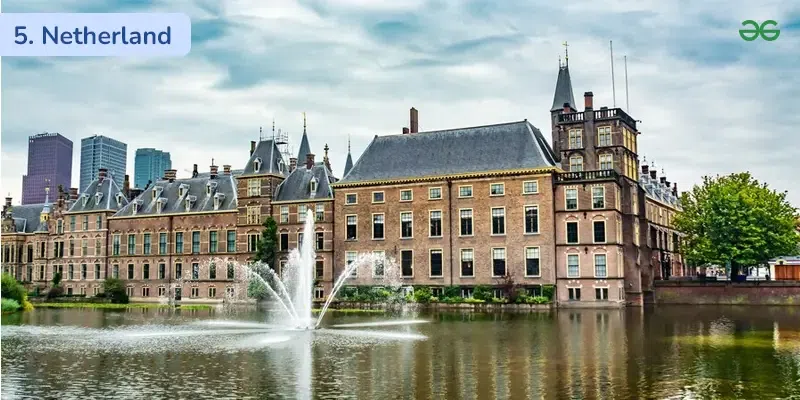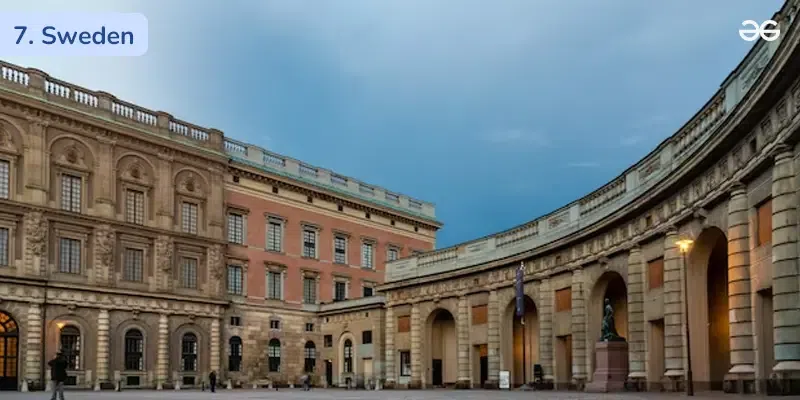Discover the Top 10 Happiest Countries in the World in our latest article. Every year, the World Happiness Report 2024, a survey sanctioned by the United Nations, ranks countries based on factors like income, freedom, trust, health, and the Happiness Index, contributing to the overall well-being and life satisfaction of their citizens.
The Happiest countries in the world 2024 is Finland, as per the latest studies of 2024, leading the ranking with its high standard of living.
In this article, we will explore the countries that excel in happiness, well–being, and life satisfaction, showcasing stunning natural landscapes and strong community bonds to excellent healthcare and education systems. Whether you’re curious about the Nordic Countries’ Happiness, which often top the list, or interested in learning about other nations making their mark.
Start finding the list of Happiest Countries in the World here –
Top 10 Happiest Countries in the World
Here is the list of top 10 happiest countries in the world. According to the World Happiness Report, These are the countries that caught attention in the happiest countries in the world report because of their great look and positive vibes.
|
Rank
|
Country
|
Score
|
|
1
|
Finland
|
7.804
|
|
2
|
Denmark
|
7.586
|
|
3
|
Iceland
|
7.530
|
|
4
|
Israel
|
7.473
|
|
5
|
Netherlands
|
7.423
|
|
6
|
Sweden
|
7.391
|
|
7
|
Norway
|
7.315
|
|
8
|
Switzerland
|
7.240
|
|
9
|
Luxembourg
|
7.228
|
|
10
|
New Zealand
|
7.123
|
Happiest Countries in the World 2024
World Happiness Report 2024:
- Annual survey ranking global happiness.
- Factors include income, freedom, trust, and health.
Happiest Countries in the World
These are the 10 happiest countries in the world, according to happiness index and World Happiness Report of 2024 –
1. Finland Happiest Country
Finland consistently tops the list as the happiest country in the world, according to the World Happiness Report 2024. This country stands out for its strong sense of belonging and deep connections among people. Here, everyone enjoys a high level of freedom and independence, making life richer.
The Finnish government ensures that its citizens are well-protected with a solid support system, giving them a secure feeling. Economically, Finland is doing well, allowing for great opportunities for everyone to improve their lives. Being part of the European Union (EU) also means Finns can easily travel and work across 30 different countries, adding to the benefits they enjoy.
All these factors together make Finland the number one country for happiness around the globe, inviting others to learn from their example on how to create a joyful society.

Facts on Finland –
- Quality of Life: Finland consistently ranks high globally for its quality of life. It offers excellent healthcare, education, and safety standards, making it a sought-after place to live.
- Education System: Finland’s education system is renowned for its excellence worldwide. It focuses on creativity, critical thinking, and student well-being rather than standardized testing, leading to consistently high academic performance.
- Nature and Environment: Finland boasts breathtaking natural landscapes, including thousands of lakes, forests, and picturesque national parks. Its commitment to environmental conservation and sustainability further enhances its appeal.
- Gender Equality: Finland is known for its strong commitment to gender equality, with one of the smallest gender gaps globally. Policies promoting equal opportunities for men and women in education, employment, and politics contribute to this achievement.
- Low Crime Rates: Finland enjoys relatively low crime rates compared to many other countries, fostering a safe and secure environment that contributes to the overall well-being and happiness of its residents.
2. Denmark Happiness Ranking
Close to Finland, Denmark grabs the 2nd place in the happiest countries in the world according to the World Happiness Report. The happiness in Denmark comes from its strong support system for everyone, which is a common feature of Scandinavian countries’ way of looking after their people.
In Denmark, people enjoy free medical care, education benefits, help with childcare costs, and good parental leave. These supports are key reasons why people in Denmark are so satisfied. Also, people in Denmark get along well and trust each other. They all work together to make sure everyone is doing well.

Facts on Denmark –
- Happiness Index Ranking: Denmark consistently ranks among the top happiest countries globally according to the World Happiness Report, maintaining its position at the forefront for numerous years.
- Quality of Life: Denmark boasts a high standard of living, characterized by exemplary healthcare, education, and social welfare systems. Its commitment to gender equality, environmental sustainability, and work-life balance contributes significantly to its citizens’ contentment.
- Strong Economy: Denmark possesses a resilient and diverse economy marked by low unemployment rates, elevated wages, and a robust welfare state. Renowned for its well-functioning social security system, Denmark ensures its populace enjoys social protection and access to essential services.
- Progressive Social Policies: Denmark’s social policies prioritize equality, education, and healthcare, exemplifying the government’s substantial investments in citizen welfare and professional growth opportunities.
- Work-Life Balance: Danes relish a harmonious work-life equilibrium, benefiting from reduced working hours and generous vacation allocations. The cultural emphasis on leisure, familial bonds, and communal engagement fosters overall happiness and satisfaction.
3. Iceland Happiness Index
Iceland, known as the “Land of Fire and Ice,” is not just a happy place but also a leader in safety and equality between men and women. The country enjoys a strong income, a stable economy, very little corruption, a generous nature, free education, and a strong sense of togetherness. These are some of the key reasons why people there feel so content. Also, seeing some of the world’s most amazing natural wonders every day definitely adds to their happiness.
Facts on Iceland –
- Geography: Iceland, situated in the North Atlantic Ocean, boasts remarkable landscapes including volcanoes, geysers, hot springs, and glaciers.
- Population: With approximately 368,000 inhabitants, Iceland maintains one of Europe’s lowest population densities.
- Capital: Reykjavik, Iceland’s capital, stands as the world’s northernmost capital city.
- Language: Icelandic serves as the official language, with English widely spoken, especially in urban areas.
- Economy: Iceland’s economy is diverse, driven by tourism, fishing, renewable energy, and technology.
4. Israel Happiness Ranking
Even with challenges in Israel, the nation climbed five spots in 2024. Israel values freedom, family, economic chances, and a deep cultural background. The freedom to live as one chooses and close family ties bring happiness. Wealth, top-notch medical care, and good schools support people’s health and happiness. The World Happiness Report and other happiness-related indices consider a variety of metrics, including economic, social, and personal factors, to determine the overall happiness of countries worldwide.
Facts on Israel –
- Economic Stability and Innovation: Israel has a strong economy, characterized by a high standard of living, a vibrant tech sector, and significant investment in research and development. Its status as a “Start-Up Nation” with a thriving high-tech industry contributes to economic opportunities and job satisfaction among its citizens.
- Healthcare System: Israel boasts a universal healthcare system that is both efficient and effective, providing high-quality medical services to all its citizens. The accessibility and quality of healthcare contribute to the overall well-being of the population.
- Education: The country has a well-developed education system, with several universities ranking among the top in the world. High educational standards and opportunities for advanced studies play a crucial role in personal and professional development.
5. Netherlands Happiness Index
As per World Happiness Report, the 5th in the list happiest countries in the world is Netherlands, this country simply means “Low Countries,” its flat landscapes might contribute to its efficient infrastructure and social programs. These, in turn, translate to access to healthcare, education, and other necessities, boosting well–being.

Facts on Netherlands –
- Population: The Netherlands has a population of approximately 17.5 million people (2023 estimate).
- Land Area: It covers an area of about 41,543 square kilometers, making it one of the most densely populated countries in the world.
- Capital: The capital city of the Netherlands is Amsterdam, known for its picturesque canals, historic architecture, and vibrant cultural scene.
- Government: The Netherlands is a parliamentary constitutional monarchy, with King Willem-Alexander serving as the head of state and the Prime Minister leading the government.
- Economy: The Netherlands has a highly developed and diverse economy, with a focus on international trade, finance, agriculture, and manufacturing.
6. Sweden Happiness Score
As the 6th in the list of happiest countries in the world, “Kingdom of Sweden” echoes its historical stability and strong institutions. Swedes enjoy high levels of trust in government and social support networks, offering a sense of safety and belonging. Add to that a generous welfare system and focus on work-life balance, and you have a recipe for contentedness.

Facts on Sweden –
- Population: Sweden’s population stands at around 10.4 million people according to the latest data.
- Area: Covering approximately 450,295 square kilometers, Sweden ranks among the largest countries in Europe.
- Capital: Stockholm, known for its scenic archipelago and vibrant cultural scene, serves as the capital and largest city in Sweden.
- Government: Sweden operates as a constitutional monarchy with a parliamentary democracy, where the King serves as the head of state and the Prime Minister heads the government.
- Economy: Sweden boasts a robust mixed economy with a focus on innovation and technology, prominently featuring industries such as manufacturing, services, and telecommunications.
7. Norway Happiness Score
Norway is the 7th in the list happiest countries in the world, The “Kingdom of Norway” reflects its long-standing monarchy and stable political system, factors associated with trust and security. However, Norway’s happiness might also stem from its stunning natural beauty and emphasis on outdoor activities, promoting well-being. Additionally, boasting high income and low inequality, Norway ensures financial security for its citizens.

Facts and Figures about Norway –
- Geographical Features: Norway, situated in Northern Europe, is bordered by Sweden, Finland, and Russia. Its diverse landscape includes fjords, mountains, and coastlines.
- Population and Demographics: With around 5.4 million inhabitants, Norway’s largest city is Oslo, followed by Bergen and Trondheim.
- Economy: Norway’s mixed economy relies on both private and public sectors, with a significant focus on oil and gas exports.
- Quality of Life: Norway consistently ranks high in global indices for quality of life, education, healthcare, and happiness due to its welfare system and social benefits.
- Sustainability and Environmental Initiatives: Norway leads in sustainability, investing in renewable energy and eco-friendly transportation like electric vehicles.
8. Switzerland Happiness Index
Switzerland is the 8th in the list of happiest countries in the world, Which is known as the “Confederation of Switzerland,” its name emphasizes unity and collaboration is worlds most beautiful and one of the most happiest place to live. This might explain its success in building trust and social support, both key happiness factors. Additionally, Switzerland enjoys high per capita income and a healthy life expectancy.

Facts and Figures About Switzerland –
- Geography: Switzerland is a landlocked country located in Central Europe, bordered by Germany, France, Italy, Austria, and Liechtenstein. It is known for its stunning alpine landscapes, including the Swiss Alps and numerous lakes.
- Population: As of 2023, Switzerland has a population of approximately 8.7 million people. The country is known for its cultural diversity, with four official languages: German, French, Italian, and Romansh.
- Economy: Switzerland has a highly developed and prosperous economy, known for its banking and finance sector, pharmaceutical industry, and high-quality manufacturing. It has one of the highest GDP per capita in the world.
- Quality of Life: Switzerland consistently ranks high in terms of quality of life indices, including education, healthcare, safety, and overall well-being. The country offers excellent public services and infrastructure.
- Neutrality: Switzerland is known for its long-standing policy of neutrality in international conflicts. It has not been involved in any military conflicts since 1815 and is home to many international organizations, including the Red Cross and the United Nations Office at Geneva.
9. Luxembourg Happiness Ranking
“Grand Duchy of Luxembourg” reflects its unique status as a small, independent nation. Luxembourg is considered as nineth in the list of happiest countries in the world. This fosters a strong sense of national identity and community, contributing to social support and cohesion. Furthermore, Luxembourg boasts one of the highest GDPs per capita globally, translating to material comfort and opportunity.

Facts on Luxembourg –
- Size and Location: Luxembourg is a small landlocked country situated in Western Europe, bordered by Belgium to the west and north, Germany to the east, and France to the south.
- Population: As of 2023, Luxembourg has a population of around 634,000 people, making it one of Europe’s smallest countries by population.
- Economy: Luxembourg boasts a highly developed economy, characterized by a strong banking and financial sector. It is renowned for its favorable business environment, low tax rates, and robust GDP per capita, ranking among the world’s highest.
- Multilingualism: Luxembourg is a multilingual country with three official languages: Luxembourgish, French, and German. English is also widely spoken, particularly in business and finance sectors.
- Cultural Diversity: Despite its small size, Luxembourg is home to a diverse population, including immigrants from various countries. This cultural diversity contributes to the country’s vibrant cultural scene and cosmopolitan atmosphere.
10. New Zealand Happiness Ranking
New Zealand is on tenth among the list of happiest countries in the world, “Aotearoa,” meaning “Land of the Long White Cloud,” refers to its beautiful natural environment. New Zealanders benefit from strong social support systems and a relaxed, outdoor lifestyle, both linked to happiness. Trust in government is also high, contributing to a sense of security and stability.

Facts on New Zealand –
- Geography: New Zealand is situated in the southwestern Pacific Ocean, consisting of two main islands, the North Island and the South Island, along with several smaller islands. Its diverse landscapes encompass mountains, beaches, forests, and lakes.
- Population: With an estimated population of around 5 million people, New Zealand’s urban areas are the primary residence for most of its inhabitants, with Auckland being the largest city.
- Economy: New Zealand boasts a varied economy, with key sectors including agriculture, tourism, manufacturing, and services. Its exports encompass dairy, meat, wine, and forestry products.
- Culture: A fusion of Maori, European, Pacific, and Asian influences shapes New Zealand’s culture. Maori traditions, language, and art hold significant cultural importance.
- Happiness Ranking: New Zealand consistently ranks among the world’s happiest countries.
Also Check:
Australia Happiness Score
- Love for the outdoors and strong social networks.
- High-quality life with emphasis on environmental care.
Conclusion
We checked out the Top 10 Happiest Countries in the World teaches us a lot about what makes people happy in terms of happiness, well–being, and life satisfaction. These countries, ranked by the United Nations’ World Happiness Report based on a comprehensive survey, show us that having a high standard of living, good support from others, freedom to make life choices, trust in the government, and good health care are key to ranking high on the list. The Report highlights every year that being part of a community and treating everyone fairly contributes significantly to a country’s happiness index.
From these happiest countries in the world, we learn that being happy isn’t just about having a lot of money; it’s also about feeling connected and supported. These lessons can help other countries figure out how to make their people happier. It’s all about making life better for everyone.
Top 10 Happiest Countries in the World – FAQs
Why is Finland consistently ranked as the happiest country in the world?
Finland’s high happiness ranking is attributed to its strong social support system, freedom to make life choices, low corruption, and high regard for generosity and well-being.
What factors are considered in the World Happiness Report?
The report considers factors such as income, freedom, trust, healthy life expectancy, social support, and generosity.
How does Denmark maintain its happiness ranking?
Denmark boasts a robust social safety net, a high level of equality, and a strong sense of community, contributing to its happiness.
What makes Iceland one of the happiest countries?
Iceland’s happiness is linked to its tight-knit community, stunning natural landscapes, and comprehensive welfare system.
Why is Sweden ranked high in happiness?
Sweden’s high happiness score comes from its well-developed welfare state, emphasis on equality, and high standards of living.
What role does social support play in the Netherlands’ happiness?
The Netherlands’ happiness is partly due to its excellent social support network, work-life balance, and progressive policies.
How does Norway achieve its happiness ranking?
Norway’s happiness is supported by its wealth, natural resources, and strong sense of community and mutual trust among its citizens.
What distinguishes Luxembourg in the happiness rankings?
Luxembourg’s high ranking is attributed to its robust economy, high standards of living, and comprehensive social programs.
Why is Switzerland considered one of the happiest countries?
Switzerland’s happiness is due to its political stability, strong economy, and focus on individual rights and freedom.
How does Australia rank among the happiest countries despite its geographical isolation?
Australia’s happiness is linked to its quality of life, outdoor lifestyle, strong sense of community, and effective governance
What is the happiest country in the world?
Finland is the happiest country in the world, according to the World Happiness Report of 2024.
Which is the happiest countries in the world?
Finland is considered as most happiest country in the world, might owe its name to its breathtaking natural beauty, fostering well-being and outdoor activities.
What is the Top 10 Happiest Countries in the World?
The Top 10 Happiest Countries in the World are : 1. Finland 2. Denmark 3. Iceland 4. Israel 5. Netherlands 6. Sweden 7. Norway 8. Switzerland 9. Luxembourg 10. New Zealand
What are the 2 happiest countries?
According to the 2024 World Happiness Report, Finland is the happiest country in the world for the sixth year in a row. It’s followed by Denmark, Iceland, Israel, and the Netherlands in the annual survey released in 2024, that ranks countries by how happy their citizens perceive themselves to be.
What criteria are used to determine happiness rankings?
The criteria include economic factors, social support, life expectancy, freedom to make life choices, generosity, and perceptions of corruption.
Why are Scandinavian countries often ranked among the happiest?
Scandinavian countries prioritize social welfare policies, work-life balance, and equality, which contribute to their high happiness rankings.
Share your thoughts in the comments
Please Login to comment...